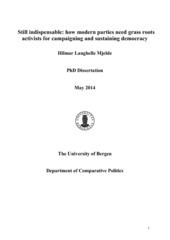| dc.contributor.author | Mjelde, Hilmar Langhelle | eng |
| dc.date.accessioned | 2014-08-18T09:57:57Z | |
| dc.date.available | 2014-08-18T09:57:57Z | |
| dc.date.issued | 2014-06-13 | eng |
| dc.identifier.isbn | 978-82-308-2906-6 | |
| dc.identifier.uri | https://hdl.handle.net/1956/8296 | |
| dc.description.abstract | This dissertation argues that modern political parties still need grass roots activists for campaigning and sustaining democracy. Western European parties have lost members at an increasing rate over the last 50 years and the decline shows no signs of stopping, but existing literature on party organization and campaigning holds that this is mostly unproblematic, since parties have also changed the way they operate. Since the dawn of the professionalized, media-centered campaign in Western societies in the 1950s, modern campaigning has transformed from labor- to capital-intensive, and parties are therefore said to have little need for grass roots activists, whether formally enrolled or not. In four articles and the introduction, based on both a small- and medium-N research design and data from a broad variety of primary and secondary sources, this dissertation counters the obsolescence claim by showing that modern parties in Western Europe and the US have not really changed that much. They still rely on grass roots activists to perform a variety of campaign-related functions: the activists contribute voluntary labor, funds, votes, and staff the party, including by running as candidates. Professionalized staff and mediaoriented campaigns have thus supplemented rather than replaced grass roots activists. Moreover, I argue that we should think more broadly, beyond campaigns and elections, about the democratic role of grass roots activists in modern parties: by linking parties with civil society, maintaining their organizational presence in local communities, and helping parties sustain their organizational heritage as mass-based organizations, grass roots activists also support democratic government. This democracy-supporting function is insufficiently recognized by existing literature. This dissertation thus revises existing literature on parties’ demand for grass roots activists in campaigning and emphasizes the grass roots activists’ role in sustaining democracy. | en_US |
| dc.language.iso | eng | eng |
| dc.publisher | The University of Bergen | eng |
| dc.relation.haspart | Paper 1: Mjelde HL. (2013) Fremskrittspartiets organisatoriske utvikling fra 1973 til 2013: fra anti-parti til masseparti?. Norsk statsvitenskapelig tidsskrift 29 (2): 120-28. The article is available at: <a href="http://hdl.handle.net/1956/8295" target="blank">http://hdl.handle.net/1956/8295</a> | eng |
| dc.relation.haspart | Paper 2: Mjelde HL. (2013) How and why parties respond to membership decline: the case of the SPD and the CDU. German Politics 22 (3): 253-69. The article is available at: <a href="http://hdl.handle.net/1956/9573" target="blank">http://hdl.handle.net/1956/9573</a> | eng |
| dc.relation.haspart | Paper 3: Mjelde HL. (2014) A new source of linkage: non-member participation in Western European parties. The article is not available in BORA. | eng |
| dc.relation.haspart | Paper 4: Mjelde HL and Svåsand L. (2014) Fumbling in the dark: Party response to electoral shocks and the case of the Norwegian Høyre and the US Republican Party. The article is not available in BORA. | eng |
| dc.title | Still indispensable: how modern parties need grass roots activists for campaigning and sustaining democracy | eng |
| dc.type | Doctoral thesis | en_US |
| dc.rights.holder | Copyright the author. All rights reserved | en_US |
| dc.identifier.cristin | 1134580 | |
